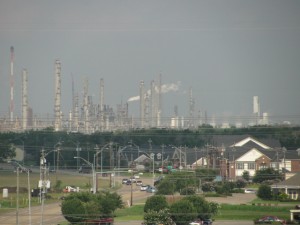Did Texas Hurt Industry by Fighting EPA Greenhouse Gas Regs?

Dave Fehling / StateImpact
ExxonMobil's refinery in Baytown is one of the nation's biggest
The Texas Commission on Environmental Quality has begun the process to begin issuing air pollution permits for industrial plants that emit greenhouse gases linked to climate change. The permits will be based on new rules put in effect in 2011 by the U.S. Environmental Protection Agency in response to research on global warming.
It’s probably not a result Texas Governor Rick Perry had in mind back in 2010 when he and the Texas attorney general held a news conference. They said the new rules would be so costly to industry that they would be disastrous for the Texas economy.
“My office has worked closely with Attorney General Abbott to consider all options to challenge this seriously flawed EPA finding…to head off an economic calamity…We are challenging the EPA’s findings for CO2 and other greenhouse gases,” Perry said in February 2010.
Three years later, that legal challenge has been through the federal courts and now has landed in the U.S.Supreme Court. The high court let stand a lower court ruling that supported the EPA’s contention that it had the right to regulate greenhouse gases under the Clean Air Act. Texas and other states along with industry groups argued that it did not. Early next year, the Supreme Court will consider if the EPA’s right to regulate such emissions extends to “stationary sources” like industrial plants as opposed to “mobile sources” like cars.
Left in the Lurch
But it’s what Texas did — or did not do —- in those three years that supporters of the new regulations say makes little sense if Texas wanted to help Texas power plants and refineries. Unlike many other states that chose to start issuing permits based on the new rules, Texas did not.
“Texas initially refused to operate the program which left manufacturers, power plant developers — anybody with big factories that wanted to expand — completely in the lurch because you cannot build those things unless there is someone there to write the permits,” said David Doniger, policy director for clean air issues at the Natural Resources Defense Council.
The EPA stepped in and begin processing the permits at its regional office in Dallas. But dozens of the applications began piling up. Industry groups complained that it was taking too long. The groups backed legislation that was passed earlier this year by state lawmakers authorizing the Texas Commission on Environmental Quality (TCEQ) to begin processing the greenhouse gas permits.
Back to Business
One of the most affected industries are power plants. A group that represents big electricity generators including Luminant and NRG said while they expect the new rules to add to the cost of doing business, they’re happy the TCEQ is taking over the permitting process.
“It’ll be a more certain, more prompt and less expensive process for us,” said John Fainter with the Association of Electric Companies of Texas.

Courtesy San Antonio Chamber of Commerce
Texas Attorney General Greg Abbott
Has the litigation filed by Attorney General Abbott done industry more harm than good?
“I’m going to leave the attorney general to speak for himself on taking the action. We certainly did not object to it. The fact of the matter is the Supreme Court had ruled that the EPA was going forward,” Fainter told StateImpact.
The Fight Continues
What does Attorney General Abbott (who’s now a Republican candidate for governor) think about critics who say his actions created delay and uncertainty for industries that wanted to expand in Texas? His office emailed a response:
“There is an enormous difference between TCEQ regulating industry under direct orders from the Texas Legislature and the EPA regulating industry without any authorization from Congress. Congress had an opportunity to pass laws regulating greenhouse gases and declined to do so. EPA’s greenhouse gas regulations are the arbitrary and illegal actions of a runaway bureaucracy that is bent on pursuing its agenda regardless of what the law says.”
The email said the attorney general’s office would continue to fight the greenhouse gas rules.
Some environmentalists in Texas ask, why?
“I think Texas just worked itself into a no-win situation. It was unclear how they ever thought that pursuing these actions would lead to some beneficial outcome for business or for anybody else. For public health, for that matter,” said Elena Craft, a toxicologist in Austin who has advised the EPA and who is with the Environmental Defense Fund.

